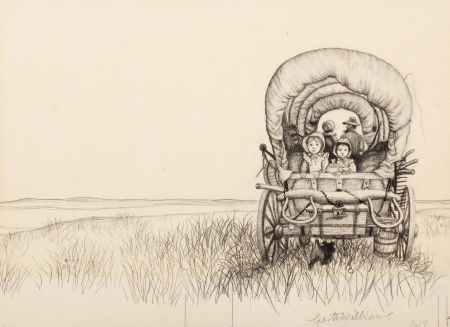Wednesday
The reviewer of a new book on Laura Ingalls Wilders makes a provocative claim. If the author of the Little House books were alive today, New Republic’s Vivian Gordnick writes,
she would be a member of the Tea Party. She would almost certainly have voted for Donald Trump, many of whose followers yet believe that he will restore to them the dubious glory of the frontier America that Wilder so passionately celebrated in her books.
Gordnick is reviewing Caroline Fraser’s Prairie Fires: The American Dreams of Laura Ingalls Wilder, which she lauds as “an impressive piece of social history that uses the events of Wilder’s life to track, socially and politically, the development of the American continent and its people.”
Wilder and her family were incurable frontier romantics, and Gordnick observes that the Little House books vividly reflect first-hand experience of white America’s push westward. The Wilders began by settling land that had been promised to the Osage Indians. After the government forced them out, they began bouncing around the country:
Thus began the years-long wander that was to become the Ingalls family’s existence. First, it was back to Wisconsin, then on to Minnesota, after that to Iowa, then back to Minnesota, and at last on to the Dakota Territory, where, now on the brink of old age, the Ingalls parents lived out the rest of their days. Wherever they went, they had encountered the viscerally undreamt-of horrors that were routine on the frontier: Indians who threatened, locusts that devoured, blizzards that blinded, crops that failed. The Ingallses found none of this disheartening. Imbued with the adolescent conviction that every failure was a new beginning, each time they pulled up stakes and tried again. Laura sat in the back of the wagon looking up at a sky full of brilliant color (there are no skies like the skies in the Great Plains), smelling the sweet grass of the vast open prairie, and feeling the excitement of starting anew. Charles Ingalls was truly Huck Finn lighting out for the territory and Laura was, if nothing else, her father’s daughter.
According to Prairie Fires, the Wilders’ idealism made them susceptible to conmen:
When the Dakota Boom hit at the end of the 1870s, the Ingallses were among those who responded to the government’s call to settle the territory. This time it really was a scam. In 1877, Fraser tells us, the scientist John W. Powell gave a speech on “The Public Domain,” arguing that the government should not be urging the Dakota Territory as a destination for homesteaders. Less than 3 percent of that arid, bleached-white land, Powell said, was suitable for farming. Nonsense, replied the railroad owners and the government along with them. And again the pioneering spirit surged.
“Fundamentally,” Fraser writes, “the question was whether national decisions of significant economic import, affecting thousands of citizens, would be governed by Enlightenment science or by huckster fantasy. The outcome was immediately clear…. In a campaign comparable to modern-day corporate denial of climate change, big business and the legislators [they owned] brushed Powell’s analysis aside.” If the government had been willing to act on the advice of its own scientists, thousands could have been spared hardship and misery.
Innocent little girls can grow up to become bitter old ladies, and in the Wilders story we see today’s rightwing temper tantrum. Wilders and her daughter Rose absolutely hated the New Deal, a time when her vision of the west was giving way to that of John Steinbeck in Grapes of Wrath:
When the Depression hit, both Laura and Rose fell into a blinding rage over Franklin Roosevelt and the New Deal. Each of them announced that she now considered the American republic at an end, its people having fallen into the hands of a socialist dictator. This state of affairs had come about, Laura concluded, because the country was full of “shirkers.” Her daughter went her one better: “The more I see,” Rose declared in a letter, “the more I’m reluctantly concluding that this country’s simply yellow. Our people are behaving like arrant cowards. And it’s absurd.” She saw nothing “fundamentally wrong” with the country. At the very time Rose was writing this, in the early 1930s, 13 million workers lost their jobs, leaving nearly one-quarter of the country unemployed. Ten thousand banks went under, and industrial stocks fell to nearly 20 percent of their value. For Rose Lane, these statistics amounted to fake news.
In a development that is sobering for us today as seek to understand climate change denialism, Gordnick writes that federal efforts to save marginal prairie land by returning it to grass was attacked by the Wilders. This after failure to rotate crops and engage in soil erosion prevention resulted in the loss of two to five inches of topsoil from more than 23 million acres. Wilder “lamented the arrival of the grasshoppers on her land but accepted it as divine retribution for the New Deal.”
Gordnick concludes,
The Wilders among us now occupy a position so influential they have been able to elect someone of their own persuasion to the American presidency. The frontier mentality they still embody is less likely to shore up a potentially failing democracy than to wreck it altogether.
The history of America has been a perpetual cycle of dream and disillusion. What we are experiencing right now is not new.


